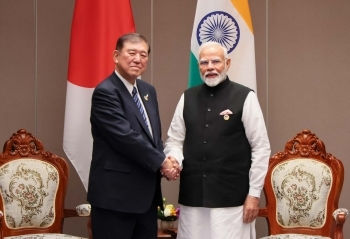India and Japan Forge Clean Energy Partnership: JBIC and PFC Ink Landmark Deal for Assam's Bio-Ethanol Project
- peeush srivastava
- Aug 29, 2025
- 2 min read

TOKYO/NEW DELHI – In a significant boost to India's clean energy goals and its "Act East" policy, the Japan Bank for International Cooperation (JBIC) and Power Finance Corporation Ltd. (PFC) have signed a landmark ¥60 billion (approximately ₹3,500 crore) loan agreement. The agreement, signed on the sidelines of Prime Minister Narendra Modi's visit to Japan, is set to finance the nation's largest second-generation bio-ethanol project in Assam.
This project, which uses bamboo as its primary feedstock, marks a new chapter in India–Japan clean energy cooperation. JBIC's loan is part of its GREEN (Global Action for Reconciling Economic Growth and Environmental Preservation) initiative and is co-financed by a consortium of Japanese private financial institutions, with JBIC guaranteeing their portion.
Assam Bio-Ethanol Project: A Bamboo-Based Green Initiative
The financing will be channeled through PFC to Assam Bio Ethanol Private Limited (ABEPL) to establish a biofuel production and power generation facility in Golaghat, Assam. The plant is slated to produce 49,000 tonnes of bio-ethanol per year from bamboo cultivated in the Northeast region.
This facility will be India's largest bio-ethanol plant, directly supporting the country's ambitious E20 ethanol blending target, which aims for 20% ethanol blending nationwide from 2025. By using bamboo—a fast-regenerating, sustainable resource—the project reinforces India’s commitment to climate change mitigation and energy security.
Strategic and Social Impact
The agreement carries significant geopolitical weight. It advances India's Act East Policy by driving investment in the Northeast and aligns with Japan's vision for a Free and Open Indo-Pacific. The partnership positions India and Japan as key drivers of regional prosperity and stability.
On the social front, the project is a beacon of rural empowerment and inclusive growth. It is expected to create new income opportunities for bamboo farmers across Northeast India, generate local jobs, and strengthen primary sector livelihoods. This sustainable industry model is poised to foster regional development and social equity.
This collaboration not only sets a precedent for sustainable investments in renewable energy but also underscores the shared vision of India and Japan in driving climate action, rural empowerment, and regional prosperity.





%20(2)_edited.jpg)




Comments